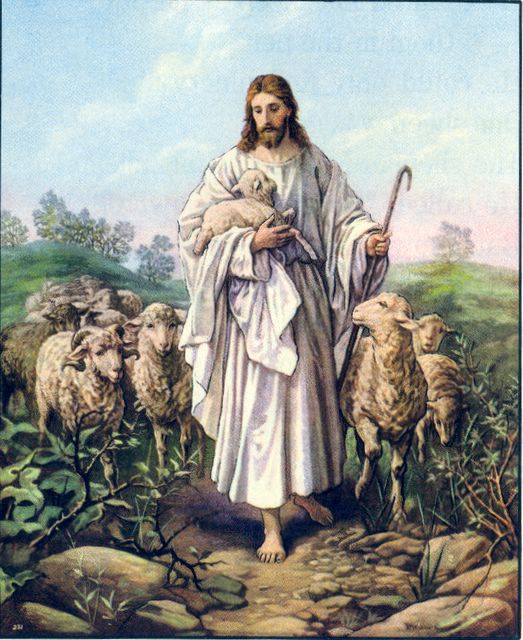
PARABLE
OF THE GOOD SHEPHERD;
THE RETURN OF THE SEVENTY.
JESUS now began to talk to the people who were about him, and had heard the conversation between himself and the man to whom he had given sight.
He told them that he had come into the world "for judgment," that they which saw not, might see, and those which saw might be made blind. In other words, he had come to judge, or decide, between the false and the true, the right and the wrong, and thus show the people what they ought to believe.
The result of this would be to give light, or sight, to those honest ones who really wanted to do right, but had been deceived, or made blind, by the Pharisees.
These wicked men really had a chance to see, or know what was right; for they had the law [that part of the Bible then written] to read, and this privilege was not given the common people. They now had a chance to receive more light, but would not have it.
They did not do the duties then known to them, and so did not want Jesus to tell them any more. So they were made blind by the very light that gave sight to those who received it; for in thus hardening their hearts, they lost the power to understand the truth that, had already been given them.
Now some of the Pharisees heard these words, and they said unto Jesus, "Are we blind also?" He told them that if they were really blind,—had not had light,—then they would not be guilty of sin; but since they were satisfied with what they had, saying, "We see," their sin remained; that is, it was unpardoned, because they were so proud and willful that they would not repent of it. He then went on to illustrate the duty of a leader, or guide, of the people by relating a parable about the good shepherd, in which he compares the people of God to a flock. The Pharisees claimed to be the guides, or shepherds, of the people, while at the same time they would not hear the instructions of Christ, the great Shepherd of his sheep, to whom all under-shepherds are responsible. In this parable, by setting forth the character of a true shepherd, he clearly shows that these proud Pharisees have no right to the name, and are entirely unfit for such a place of trust.
And there was a division among the Jews because of these sayings of Jesus. And some of them said, "He hath a devil, and is mad; why hear ye him."
Others said, "These are not the words of him that hath a devil"; and remembering the miracle he had just done, they asked "Can a devil open the eyes of the blind?"
About this time the seventy disciples returned,—those whom Jesus had sent out to preach just before he went to the Feast of Tabernacles. They seemed very much pleased with the success of their tour, and told the Saviour how they had even been able to cast out devils through his name. He then told them that he had given them power over all the power of the enemy, Satan; that they should be able to tread on serpents and scorpions without harm to themselves; and that nothing should by any means hurt them. Yet Jesus would caution his disciples against any feeling of pride over the power given them; and he bade them to rejoice not because the evil spirits were subject unto them, but rather to rejoice because their names were written in heaven.
And Jesus rejoiced in spirit, and thanked his Father in heaven that he had revealed to the poor and humble the truths of his gospel, which had been hid from those wise with the wisdom of this world. Then he spake to the people these precious words of comfort, "Come unto me, all ye that labor and are heavy laden, and I will give you rest. Take my yoke upon you, and learn of me, for I am meek and lowly of heart, and ye shall find rest unto your souls. For my yoke is easy, and my burden is light."
And he turned to his disciples, and said privately, "Blessed are your eyes, for they see; and your ears, for they hear! For I say unto you that many prophets and righteous men have desired to see those things, which ye see, and have not seen them; and to hear those things which ye hear, and have not heard them."